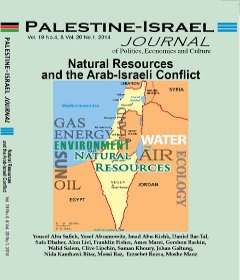As of this writing, the fragile ceasefire announced on August 26 in the Gaza Strip is still holding. Obviously, the two parties are not eager to resume fighting. An immediate denial was issued after Hamas leader and former Prime Minister Ismail Haniyeh was quoted as saying that Hamas will return to fighting at the end of the month if talks do not resume and no progress is made on substantial issues such as lifting the siege, releasing Palestinian prisoners, and paying the salaries of the 40,000 civil workers hired by Hamas after the rift with the Ramallah Fatah leadership in 2007.
While there are no guarantees that this fragile ceasefire will survive for long, international concern about the misery in Gaza is cooling down. The war was a dramatic-tragic war which attracted the attention of an "audience" almost all over the world. But with the continued ceasefire, this attention is gradually fading away. The international agenda is full of other international conflicts such as the Ukraine and the rising power of the Islamic State in Iraq and Syria (ISIS) and its involvement in the fighting in Iraq, Syria and Lebanon.
In the Gazan case, the Arab countries are more concerned about their own interests than about Gaza. These interests range from fear of the growing influence of ISIS to concerns about the Shi'a Muslims supported by Iran. Recent U.S. military actions, including air strikes against the Sunni ISIS and the need for cooperation between the U.S. and Iran raise fears among these Arab countries that the U.S. may let them down for the sake of its new "alliance" with Iran.
Opposing Iran's nuclear program and building an alliance to fight against ISIS is now at the top of the agenda of the region's Arab countries. They look at Iran and ISIS as direct threats to their own existence, and as a result the Palestinian problem is no longer the focus of their concern. The League of Arab States (commonly known as the Arab League), is still promoting the Arab Peace Initiative (API), while Israel is turning its back on peace, believing that the current standstill and the prospect of maintaining the status quo are in its favor. This frees Prime Minister Binyamin Netanyahu from making any political decisions that could cause the collapse of his right-wing coalition and, at the same time, allows the continuation of settlement activities including the confiscation of Arab lands.
In this messy situation, Gaza is being left behind. The international community has too short a memory. Concern is diminishing regarding the huge destruction caused by the Israeli attacks, which left more than 300,000 people homeless, over 2,100 killed and several thousand injured, including hundreds requiring long-term rehabilitation; and the lack of water, food and agriculture after agricultural lands were leveled and trees and all kinds of plants were uprooted.
The water, earth and air pollution in Gaza as a result of the hundreds if not thousands of tons of explosives used is another problem discussed in some of the articles published in this issue, which is devoted to natural resources.
The feeling that international attention to Gaza is diminishing plays a double role: For Israel, it enables the government to try to prevent any progress in the negotiations on the crucial demands and needs of the Gaza people, and to try to maintain the status quo - the continued siege of Gaza, a fragile ceasefire, and control over lifting or tightening its siege.
For Hamas and the people of Gaza, this will be intolerable and will lead to an explosion of violence. Such a development, which currently seems inevitable, will cause further damage and human suffering beyond what any human being could accept. It will definitely spell on both sides of the borders.
Sooner or later, the moderate Palestinian leadership represented by Palestinian Authority (PA) President Mahmoud Abbas will find itself compelled to join the International Court of Justice and sue Israel for its war crimes, including all settlement activities in the occupied West Bank and East Jerusalem. The U.S. threat to stop aid to the PA and to veto in the United Nations Security Council any such Palestinian demands, will weaken Mahmoud Abbas leadership because it will be met with tremendous criticism and pressure from the Palestinian people against their leadership to quit the fruitless talks and seek full UN membership and join all organizations related to the UN, other international treaties and multilateral organizations including the International Criminal Court. And Abbas has to choose!
The moral challenge to the international community, mainly the U.S. and European Union, is whether to allow Netanyahu's government to continue to undermine the two-state solution by its policy of siege and periodic death and destruction in Gaza and settlement activities in the West Bank and East Jerusalem - considered according to the UN Charter and international treaties including Geneva Fourth Convention as war crimes - or to push Israel to fulfill its responsibilities according to international laws, treaties and the UN Charter and put an end to the occupation of Palestinian land, enabling the Palestinian people to live in security, peace and dignity in their own independent sovereign state, along side the state of Israel. Time is running out, and many horrible scenarios are on the table.

